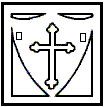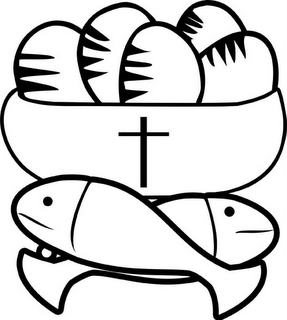
Look! He is coming with the clouds;
every eye will see him,
even those who pierced him;
and on his account all the tribes of the earth will wail.
The Lessons Appointed for Use on the Last Sunday after Pentecost:
2 Samuel 23:1-7
Psalm 132:1-13, (14-19)
Daniel 7:9-10, 13-14
Revelation 1:4b-8
Our opening hymn was Crown Him with Many Crowns The hymn verses 1, 4-9 are by Matthew Bridges (1800-1894), written in 1852. Verses 2-3were written by Godfrey Thring (1823-1903) in 1874. The hymn tune is called Diademata and was composed by George Job Elvey, (1816-1893).
Crown him with many crowns, the Lamb upon his throne.
Hark! How the heavenly anthem drowns all music but its own.
Awake, my soul, and sing of him who died for thee,
and hail him as thy matchless King through all eternity.
Crown him the virgin's Son, the God incarnate born,
whose arm those crimson trophies won which now His brow adorn;
fruit of the mystic rose, as of that rose the stem;
the root whence mercy ever flows, the Babe of Bethlehem.
Crown him the Son of God, before the worlds began,
and ye who tread where he hath trod, crown him the Son of Man;
who every grief hath known that wrings the human breast,
and takes and bears them for His own, that all in him may rest.
Crown him the Lord of life, who triumphed over the grave,
and rose victorious in the strife for those he came to save.
His glories now we sing, who died, and rose on high,
who died eternal life to bring, and lives that death may die.
Crown him the Lord of peace, whose power a scepter sways
from pole to pole, that wars may cease, and all be prayer and praise.
his reign shall know no end, and round his piercèd feet
fair flowers of paradise extend their fragrance ever sweet.
Crown him the Lord of love, behold his hands and side,
those wounds, yet visible above, in beauty glorified.
No angel in the sky can fully bear that sight,
but downward bends his burning eye at mysteries so bright.
Crown him the Lord of Heaven, enthroned in worlds above,
crown him the King to whom is given the wondrous name of Love.
Crown him with many crowns, as thrones before him fall;
Crown him, ye kings, with many crowns, for he is King of all.
Crown him the Lord of lords, who over all doth reign,
who once on earth, the incarnate Word, for ransomed sinners slain,
now lives in realms of light, where saints with angels sing
their songs before him day and night, their God, Redeemer, King.
Crown him the Lord of years, the Potentate of time,
Creator of the rolling spheres, ineffably sublime.
All hail, Redeemer, hail! For thou has died for me;
Thy praise and glory shall not fail throughout eternity.
Our second hymn was the Gospel song Soon and Very Soon, text and music by Andrae Crouch, adapted by Wm. F. Smith.
1. Soon and very soon, we are going to see the King (3 times)
Hallelujah! Hallelujah! We're going to see the King.
2. No more crying there, we are going to see the King (3 times)
Hallelujah! Hallelujah! We're going to see the King.
3. No more dying there, we are going to see the King (3 times)
Hallelujah! Hallelujah! We're going to see the King.
Our anthem was based on the Charles Wesley hymn Lo, He Comes with Clouds Descending
1. Lo, he comes with clouds descending, once for favored sinners slain;
thousand, thousand saints attending swell the triumph of his train.
Hallelujah! Hallelujah! Hallelujah! God appears on earth to reign.
2. Every eye shall now behold him, robed in dreadful majesty;
those who set at naught and sold him, pierced and nailed him to the tree,
deeply wailing, deeply wailing, deeply wailing, shall the true Messiah see.
3. The dear tokens of his passion still his dazzling body bears;
cause of endless exultation to his ransomed worshipers;
with what rapture, with what rapture, with what rapture, gaze we on those glorious scars!
4. Yea, Amen! Let all adore thee, high on thy eternal throne;
Savior, take the power and glory, claim the kingdom for thine own.
Hallelujah! Hallelujah! Hallelujah! Everlasting God, come down!
The final hymn (We only had three hymns today) was All Hail the Power of Jesus' Name by Edward Perronet. The hymn tune is Coronation, composed by Oliver Holden
1. All hail the power of Jesus' name! Let angels prostrate fall;
bring forth the royal diadem, and crown him Lord of all.
Bring forth the royal diadem, and crown him Lord of all.
2. Ye chosen seed of Israel's race, ye ransomed from the fall,
hail him who saves you by his grace, and crown him Lord of all.
Hail him who saves you by his grace, and crown him Lord of all.
3. Sinners, whose love can ne'er forget the wormwood and the gall,
go spread your trophies at his feet, and crown him Lord of all.
Go spread your trophies at his feet, and crown him Lord of all.
4. Let every kindred, every tribe on this terrestrial ball,
to him all majesty ascribe, and crown him Lord of all.
To him all majesty ascribe, and crown him Lord of all.
5. Crown him, ye martyrs of your God, who from his altar call;
extol the Stem of Jesse's Rod, and crown him Lord of all.
Extol the Stem of Jesse's Rod, and crown him Lord of all.
6. O that with yonder sacred throng we at his feet may fall!
We'll join the everlasting song, and crown him Lord of all.
We'll join the everlasting song, and crown him Lord of all.
This is one of those hymns with two equally popular settings. The Methodist Hymnal has them both side by side, numbers 154 and 155. Congregations seem to prefer one or the other and don't really like it when the pastor or choir director pulls a switch on them. I like both settings and wouldn't mind if we sang both on the same Sunday. The other setting is to the hymntune Diadem by James Ellor.
Collect: Almighty and merciful God, you break the power of evil and make all things new in your Son Jesus Christ, the King of the universe. May all in heaven and earth acclaim your glory and never cease to praise you. We ask this through our Lord Jesus Christ, your Son, who lives and reigns with you and the Holy Spirit, one God, for ever and ever.
And so the Cristian year comes to a close.






